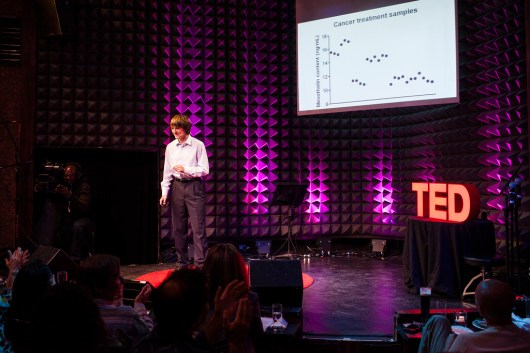Pancreatic cancer is devastating. Only 5.5% of those diagnosed with the disease survive past five years, because — once it’s diagnosed — it generally has already spread around the body. And that’s where 15-year-old high school student Jack Andraka sees a major opportunity for change. In a spirited talk given at TED@New York — one of 14 events that was part of the 2013 Talent Search — Andraka walks viewers through his cheap and accurate test for the early detection of pancreatic cancer, which recently won the world’s largest high school science competition.
What is it about your idea that you want to spread to the world, and the TED audience?
How it will revolutionize the medical field and save thousands of lives in the early detection of cancer. And how it only costs three cents and takes five minutes.
Why do you think this discovery wasn’t made before?
Because a bunch of scientists are bound to one specific field. They’re not allowed to wander outside of it. But also, we’re just laying out these interdisciplinary approaches, and carbon nanotubes haven’t been out there for that long, maybe ten years. So these new revolutions are typical now of how carbon nanotubes are revolutionizing our everyday life.
What are the next steps for this test? How long until we would see it available for use?
The most important point to remember is that this is a very preliminary study on the development of this assay for the early detection of pancreatic cancer. We are still a long way from solving pancreatic cancer; there is still a lot of research to conduct not only on this assay but on a variety of factors from genetics to therapeutics. This assay will not solve all of the problems that we face with pancreatic cancer and the assay, while a huge leap in the field of early detection, is not quite ready to enter clinical trials. We are still several years from seeing this sensor come onto the commercial market for use in general checkups.
Future testing includes using the sensor on additional human samples, including chronic pancreatitis and stage I and pre cursor lesions, monitoring if the assay gives false-positives for chronic pancreatitis, and inter-institutional studies. The results so far look extremely promising for the sensor due to its observed sensitivity, how little it costs, and how fast it is, however we just
simply won’t know for sure until all of the testing is completed. This is a glimmer of hope in the fight against pancreatic cancer and I’m extremely excited about continuing my research on this.
What’s your plan? I assume you’ll finish high school. Are you going to take an accelerated route?
I like sticking with my age group, just because I don’t see how I could ever talk and relate to 21-year-olds — except if I’m talking about science of course. Then I’m going to go through high school, then probably college and grad school. Just the typical American student path.
Watch out for more Q&As from the TED@NY event throughout this week. Head to TalentSearch.TED.com to watch and rate these talks, as well as those from the 13 other stops along the TED2013 Talent Search tour.

Comments (35)
Pingback: MAGIC VIDEO HUB | The one rule in Jack Andraka’s basement laboratory—don’t burn the house down
Pingback: The one rule in Jack Andraka’s basement laboratory—don’t burn the house down | TokNok Multi Social Blogging Solutions
Pingback: 8 diagnostic tests we could have at our disposal in the near future - Entrepreneur News | Australian Society of Entrepreneurs
Pingback: Un joven estadounidense crea una prueba para detectar el cáncer de páncreas. | 1buenanoticia
Pingback: Detecting pancreatic cancer early: Q&A with 15-year-old Jack Andraka | pfcsystems
Pingback: An early detection test for pancreatic cancer: Jack Andraka at …
Pingback: Detecting pancreatic cancer early: Q&A with 15-year-old Jack Andraka « I Am Locutus of Borg
Pingback: Jack Andraka, un produs al scolii americane - eWeekend.ro
Pingback: Detecting pancreatic cancer early….literally | Health Economics
Pingback: Il test per rilevare il cancro al pancreas: efficace, economico, veloce | Pianeta Salute Web
Pingback: 9 talks by impressive kids | Krantenkoppen Tech
Pingback: 5 teenage cancer innovators « My Blog
Pingback: Cancer » Blog Archive » TED Blog | 5 teenage cancer innovators
Pingback: 5 teenage cancer innovators | Krantenkoppen Tech